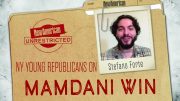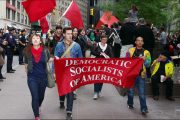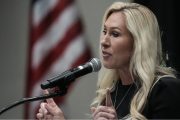Of the two top Republican contenders in the race to occupy the Oval Office, one is a wealthy, Ivy League-trained, self-professed outsider with substantial ties to a powerful New York banking behemoth, and the other one is Donald Trump.
Donald Trump and Ted Cruz each claim the label of outsider and anti-establishment, yet even a cursory scan reveals that these “outsiders” are seeking the advice of a number of high-ranking, influential “insiders.”
We’ll begin by looking at a couple establishment/neocon heavyweights who have Donald Trump’s ear.
First, the Trump campaign has named Senator Jeff Sessions (R-Ala.) the chairman of his National Security Advisory committee.
There are several standards one could use to measure Sessions’ commitment to the Constitution, perhaps the most reliable of which is The New American’s Freedom Index. As explained in the introduction to the Freedom Index published on January 25 of this year, the Index “rates congressmen [including senators] based on their adherence to constitutional principles of limited government, fiscal responsibility, national sovereignty, and a traditional foreign policy of avoiding foreign entanglements.”
Sessions’ “cumulative freedom score” is a 72 percent. While that is admittedly above average (the average score of senators in the latest print edition of the Freedom Index was 44 percent), there were, for the sake of comparison, two dozen members of the House of Representatives who received perfect scores in the same index.
Here are some of Sessions’ votes on national security-related matters, included in the Freedom Index, that constitutionalists would take issue with:
• Voted to extend provisions of the Patriot Act that were set to expire, including the “roving wiretap” provision (May 26, 2011).
• Voted to amend the Foreign Intelligence Surveillance Act to allow warrantless surveillance of phone conversations and e-mails of foreign targets including those communicating with Americans (July 9, 2008).
• Voted for authorizing the President to go to war against Iraq, without a declaration of war as required by the Constitution (October 11, 2002).
• Voted to expand NATO and offer military assistance to several countries in the former Soviet bloc (May 17, 2002).
• Voted to table (kill) an amendment intended to prevent the deployment of U.S. combat troops to Yugoslavia without a congressional declaration of war (May 25, 1999).
Another indication of Sessions’ potential predilection for approving American military operations around the world is the fact that the defense industry contributes more money to Senator Sessions than does any other industry sector, as reported by OpenSecrets.
In an announcement of Session’s appointment to head his national security team made on March 3, Trump said: “It is an honor to have Jeff as a member of the team. I have such great respect for him and I look forward to working with him on the issues most important to Americans.”
Given his record as listed above, the question must be asked whether a President Trump would support the unconstitutional policies promoted by Senator Sessions, including undeclared wars in the Middle East, extending the Patriot Act, and removing constitutional barriers to the expansion of the surveillance state.
In fairness, there is always the possibility that Trump listens to and rejects Sessions’ counsel on such matters as the expansion of the U.S. armed forces’ oversees engagements. Additionally, despite his apparent willingness to bypass the Constitution in areas of warrantless searches and seizures and executive “war powers,” Senator Sessions has been a vocal opponent of the Trans-Pacific Partnership (TPP), a surrender of sovereignty masquerading as a “free trade” agreement. And to his credit, Donald Trump has also strongly expressed his opposition to the so-called “free trade” agenda. So, while it would be lamentable if Donald Trump followed Sessions’ lead on some important issues of domestic and foreign policy, it would be commendable if Trump were to adhere to Sessions’ advice on the TPP and reject it as president.
Finally, saving what could be the biggest hint of Donald Trump’s embrace of establishment foreign and domestic policy, there is Richard Haass, the president of the Council on Foreign Relations (CFR).
During an appearance on the MSNBC show Morning Joe, Trump praised Haass as someone he admired very much. Later that same day at the Republican debate in Detroit, when asked by moderator Brett Baier to reveal two or three names of people that he would “trust for national security,” Trump answered, “I think Richard Haass is excellent. I have a lot of respect for him.”
While admittedly not a full-throated endorsement of every CFR policy position, Trump’s comments could hint at a future Trump administration that would count the head of the CFR among its national security advisers.
For those unfamiliar with the CFR, here’s a brief recap of this group’s involvement in U.S. foreign policy:
For decades since its creation, the Council on Foreign Relations has been the “mother ship” of the internationalist establishment and the source of marching orders for the successive State Departments.
Perhaps the best evidence of the influence of this organization was revealed during a speech delivered at CFR headquarters in New York City in 2009, by then-Secretary of State Hillary Clinton. In her remarks, Clinton offered an accurate and chilling assessment of the relationship between the CFR and American foreign policymakers:
“We get a lot of advice from the Council, so this will mean I won’t have as far to go to be told what we should be doing and how we should think about the future.”
How prevalent have members of the CFR been in the highest ranks of American politics?
The administrations of every president since Franklin D. Roosevelt have been filled with members of the CFR. From cabinet-level secretaries to the lowest-ranking sub-bureaucrat, presidents have turned to the CFR as the in-house personnel pool.
This path has been faithfully followed by every president — Republican or Democrat — including Barack Obama.
For a full and frightening account of the origin, purposes, and practices of the CFR, readers should turn to James Perloff’s seminal book on the subject, The Shadows of Power: The Council on Foreign Relations and the American Decline. Originally published in 1988, the information provided by Perloff is timeless and timely.
In contrast to Trump, during an appearance in Maine the day after the Detroit debate, Ted Cruz called out Trump for his praise of Haass.
“Richard Haass is a lifelong liberal. He is someone who has advised Hillary Clinton in the State Department. What does it say about you that Donald Trump and Hillary Clinton both listen to the same adviser?” Cruz said.
“For him [Donald Trump] to admit that the first name he’d listen to on foreign policy is the president of the Council on Foreign Relations, a liberal, Hillary Clinton acolyte, is a fairly extraordinary admission,” he added.
Given this forceful condemnation of Trump’s praise of Richard Haass and the CFR, one wonders how Ted Cruz’s wife, Heidi, felt when she heard this, given that she is listed as a member of the CFR in the group’s 2010 membership roster and she played a key role in their effort to create a North American Union.
In 2005, the Council on Foreign Relations released a document called “Building a North American Community,” a report outlining the CFR’s quest to create a North American Union based on the model of the European Union.
The report identifies its aim as detailing an “ambitious set of proposals that build on the recommendations adopted by the three governments at the Texas summit of March 2005. The Task Force’s central recommendation is establishment by 2010 of a North American economic and security community, the boundaries of which would be defined by a common external tariff and an outer security perimeter.”
In 2014, John F. McManus, who is now president emeritus of The John Birch Society, warned about the dangers lurking in such a scheme. “There can be little doubt that the intention of the globalists includes having a newly created North American Union crush independence here in the same manner that it has been crushed for 28 European nations by the European Union,” McManus wrote.
So, what of Heidi Cruz’s involvement? Mrs. Cruz was a member of the Task Force that was tapped by the CFR to analyze the proposals for the establishment of a North American Union as set out in the report.
Beginning on page 33 of the report, Heidi Cruz provided her assessment of the NAU proposal:
I support the Task Force report and its recommendations aimed at building a safer and more prosperous North America. Economic prosperity and a world safe from terrorism and other security threats are no doubt inextricably linked.
She does end her analysis by suggesting that “investment funds and financing mechanisms” that would drive the NAU “should only be developed in conjunction with market participants.” However, her statement that “market participants” should be involved does not change the fact that she is on record as supporting “recommenations aimed at building” North American union.
Perhaps most tellingly, though, the report was co-authored by Robert Pastor, who was then serving as director of the Center for North American Studies at American University in Washington, D.C. Here’s a description published by WND of Pastor’s role in merging the United States with Mexico and Canada:
In the 2007 bestselling book The Late Great USA: The Coming Merger with Mexico and Canada, Pastor was dubbed ‘the father of the North American Union’ for the influence the CFR report had on a tripartite summit meeting between the heads of state of the U.S., Mexico and Canada. The meeting culminated in President George W. Bush declaring without congressional approval the formation of the Security and Prosperity Partnership of North America.
With this kind of significant involvement with the CFR, including membership in that very group — a group Cruz referred to on another occasion as “A pernicious nest of snakes…working to undermine our sovereignty” — one would think that Ted Cruz would avoid attacking his rivals for their own attachment to the CFR.
In truth, though, Heidi Cruz’s membership in the CFR and participation in the NAU task force is not the only big league establishment entry on her résumé.
As has been widely reported, Mrs. Cruz is a managing director at Goldman Sachs. She joined the investment behemoth in 2005. Goldman Sachs spokeswoman Andrea Raphael told USA Today that Mrs. Cruz would be taking a leave of absence for the duration of her husband’s presidential campaign.
Notice, she didn’t resign from Goldman Sachs; she simply took some time off to accompany her husband on the run for the White House.
The CFR, Goldman Sachs — those are inarguably A-list players on the establishment team; but those aren’t the last of Heidi Cruz’s close connections to the neocons.
More from the WND report on Mrs. Cruz:
She served in the George W. Bush White House under Condoleezza Rice as the economic director for the Western Hemisphere at the National Security Council. She previously served as the director of the Latin America office at the U.S. Treasury Department and as special assistant to Ambassador Robert B. Zoellick, U.S. trade representative.
That’s a very impressive insider résumé.
But just because his wife runs with those in the top tier of establishment circles, that’s no indication that Ted Cruz would surround himself with those same influences were he to be elected president.
What would be more compelling evidence of Ted Cruz’s own agenda, his own fondness for the CFR and intent to follow their lead in the area of foreign policy would be the roster of advisors he has personally chosen to guide him on these key issues.
As this writer reported in The New American in October 2015, Cruz tapped CFR senior fellow for Middle Eastern studies Elliot Abrams to head up his foreign policy posse.
While the CFR is the most notorious of the associations of Abrams, it isn’t the only one. He is also a member (or former member) of the Center for Security Policy, Hudson Institute, National Endowment for Democracy, and many more.
It is likely that it is because of the membership of Abrams in the CFR that George W. Bush chose him to be his deputy national security adviser for Global Democratic Strategy and that Ted Cruz has chosen to follow his advice on questions of foreign policy.
And the CFR connection to Cruz’s foreign policy team doesn’t end with Abrams.
The chairman of Cruz’s foreign policy team is Chad Sweet.
Sweet’s professional and political background betrays Cruz’s claims of being someone who promises “not to continue going in the same direction” and to “bring power out of Washington, and back to we the people.”
Infogram’s biography of Chad Sweet includes the following associations, demonstrating that he is very much a step in the “same direction”:
“With a diverse background, starting as Director of the CIA, Chad Sweet went into the world of big banks — from Investment Banker at Morgan Stanley to VP with Goldman Sachs. He would then work for the Department of Homeland Security in the Bush Administration. Currently he is the Co-Founder of Chertoff Group.”
As a leader of the Chertoff Group, Sweet “advocated for expanding NSA metadata collection.”
This is completely inconsistent with Cruz’s condemnation of the federal government’s federal surveillance programs.
“One of the most troubling things we have seen in recent years is an expansion of federal government authority into surveilling American citizens. I am proud to be a co-sponsor of the USA Freedom Act,” Cruz said during a speech in Austin in November 2014.
That’s still not the end of Cruz’s neocon foreign policy appointments.
Another of Cruz’s foreign policy advisor is James Woolsey, a player who would be drafted in the first round of any neocon fantasy team owner.
The Infogram bio is enough evidence to convict Woolsey of being neocon to the core:
“Woolsey was a national security specialist and former Director of the CIA under the Clinton administration. He heads up many Neoconservative groups including being the Chairman of the Foundation for Defense of Democracies, and Founding Member of the Washington Institute for Near East Policy.”
More than just academic advocacy of the military-industrial complex and the global deployment of American troops to force democracy on the world, Woolsey has no problem putting the noose around those who act against the growth of the government.
In a December 2013 interview with Fox News, Woolsey made the following shocking statement when asked about NSA whistleblower Edward Snowden: “I think giving him amnesty is idiotic,” Woolsey said. “He should be prosecuted for treason. If convicted by a jury of his peers, he should be hanged by his neck until he is dead.”
Finally, there is the latest addition to Cruz’s inner circle of policy advisers: Neil Bush.
On March 8, Ted Cruz announced that Neil, the brother of former GOP contender Jeb Bush, would be joining his finance team. “I am thrilled to welcome these new members to our outstanding team. This race is winnowing down between two candidates, and this is further testament that conservatives are continuing to unite behind this campaign,” Cruz said in a statement announcing Bush’s appointment.
No one could argue with the experience possessed by the people picked by Cruz to advise him on foreign policy. The problem isn’t that his inner circle is composed of men and women of vast foreign policy experience; the problem is that their experience is in growing government, supporting surveillance, and using American troops as global peacekeepers. As constitutionalists know, each of these endeavors — pursued over and over by Cruz’s chosen advisors — is unconstitutional and not at all consistent with Ted Cruz’s public statements.
So, the two top Republican contenders each claim to be an outsider yet each has chosen to surround himself with advisors who have blue chip establishment bona fides. That isn’t to say that Donald Trump and Ted Cruz would follow without challenge or question the counsel provided by these members of their teams.
In fact, both Trump and Cruz have been attacked by the establishment for their failure to toe the party line. Neocon nabobs have taken shots at both men — a sign that neither would be the first choice of the insiders.
There is no denying, however, that both men, despite their claims of constitutional fidelity and commitment to take power away from Washington, D.C. and give it back to the people, have ties to the top echelon of globalist, neoconservative, Establishment powerbrokers that both candidates have promised to put out of business.
Photo of Donald Trump and Ted Cruz: AP Images




